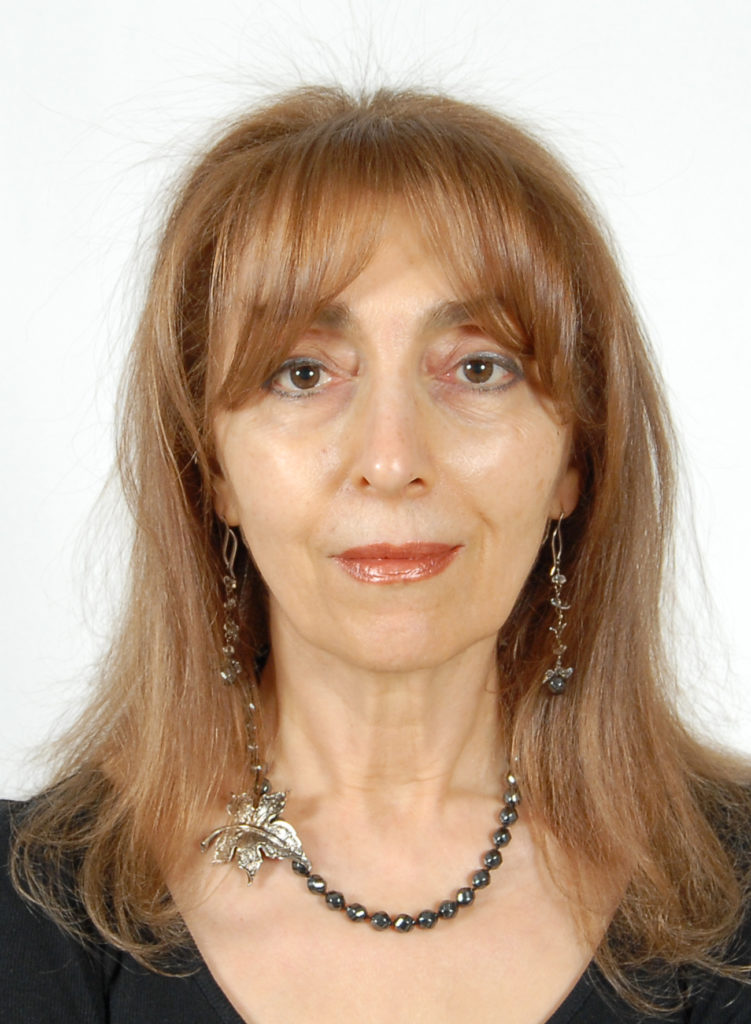Страна : Армения

Меня зовут Татьяна Аршаковна Мартиросян. Я – русскоязычный писатель армянского происхождения. Я родилась в 1954 году в г. Баку (Азербайджан). В 1976 г. окончила факультет физики Азербайджанского государственного университета, работала программистом, увлекалась поэзией и рисованием. В 1988 г. переехала с семьей в Армению. В 1994 г. окончила факультет менеджмента Американского университета Армении. В настоящее время живу в Ереване.
Я сменила множество профессий; работала программистом, журналистом, маркетологом, переводчиком, литературным редактором… Параллельно писала стихи и прозу, однако долгое время не считала литературу своим основным призванием, интересуясь в равной мере физикой, математикой, историей, психологией, рисованием. Переворот в сознании произошел под влиянием распада Советского Союза и его последствий, когда я ощутила непреодолимую потребность осмыслить совершившиеся события и облечь это понимание в литературную форму. Так появился мой первый роман – «Лежачая восьмерка», – который был опубликован в 1997 г. агентством АРМЕНПРЕСС, где я тогда работала.
Мои произведения печатались в литературных сборниках, журналах, газетах, а также выходили отдельными изданиями. В 2005 году мой роман «Закон маятника» удостоился третьей поощрительной премии жюри и оргкомитета и диплома 3-й степени на конкурсе «Русская премия», а в 2009 году я завоевала 2-е место на конкурсе научно-фантастического рассказа «АрмКон» за рассказ «Планета Блаженных».
Ниже следует список моих печатных публикаций.
Первая часть пенталогии «Лежачая восьмерка» (отдельное издание, Ереван,1997);
Рассказ «Код жизни» (журнал «Литературная Армения», Ереван, 2000);
Рассказ «Бегство от абсолюта» (сборник рассказов писателей-беженцев Закавказья «Ключи от сердец», Ереван, 2003);
Композиция из миниатюр «Бисерные нити» (журнал «Литературная Армения», Ереван, 2005);
Рассказ «Коса маятника» – журнальный вариант последней главы романа «Закон маятника» (журнал «Литературная Армения», Ереван, 2006);
Рассказ «И я бросила монету» (сборник стихов и рассказов «Возрождение на родине», Ереван, 2007);
Рассказ «День военнопленного» (сборник рассказов «Территория спора», Ереван, 2009);
Рассказ «Antionyma» (журнал «Литературная Армения», Ереван, 2009);
Рассказ «Загадочный поэт Михаил Лермонтов» (журнал «Литературная Армения», Ереван, 2010);
Рассказ «Клуб зевак» (журнал «Литературная Армения», Ереван, 2011);
Двухтомник : Том I – «Если бы Ева устояла»; Том II – «Сага о Майе» (Издательство Altaspera Publishing & Literary Agency Inc., Торонто, 2014);
Сборник стихов «Грезы о жизни», в книгу также вошла историческая пьеса «Морфия и Мелисенда» (Издательство Altaspera Publishing & Literary Agency Inc., Торонто, 2014);
Подборки стихов (журналы: «Литературная Армения», 1996, «Армянский вестник», 1998, «Закон и реальность», 2006; газеты: «Эпоха», 1991, 1992, «Урарту», 1993, «Республика Армения», 1994, «Элитарная газета», 03.2011, 12.2011; сборник стихов и рассказов «Возрождение на родине», 2007).
Country : Armenia
My name is Tatyana Martirosyan. I am a Russophone writer of Armenian origin. I was born in 1954, in Baku, Azerbaijan. In 1976 I graduated from the Azerbaijan State University, Faculty of Physics. In 1988 I left for Armenia and settled in Yerevan. Here, in 1994, I graduated from American University of Armenia.
I made quite a few career changes; I worked as a programmer, project manager, journalist, marketer, translator, literary editor, etc. At the same time, I wrote poetry and prose. However, being also interested in physics, mathematics, history, psychology, painting, I did not consider literature to be my major vocation for a long time. The “revolution in my consciousness” happened as a result of the collapse of the former Soviet Union when I felt a need to comprehend what had happened and to express that understanding in a literary form. Thus, my first novel—“The Lying Eight»—was written; it was published in 1997 by the ARMENPRESS News agency where I worked back then.
My works were published in collected stories, literary magazines, newspapers, and in separate editions. In 2005 my novel “The Law of Pendulum” won III Incentive Jury Prize and a Diploma in The International Literary Prize Russkaya Premia. In 2009 my short story “The Planet of God’s Fools” won II prize in the Armenia-based Science Fiction Contest Armcon.
Below you can see the list of my printed publications.
“The Lying Eight”, novel, separate edition, Yerevan, 1997;
“The Code of Life”, short story, “Literary Armenia” Quarterly, Yerevan, 2000;
“The Escape from the Absolute”, short story, “Collected Stories of the Writers-Refugees of South Caucasus”, Yerevan, 2003;
“The Strings of Beads”, compositions of mini stories, “Literary Armenia” Quarterly, Yerevan, 2005;
“The Scythe of Pendulum”, short story, “Literary Armenia” Quarterly, Yerevan, 2006;
“And I Threw the Coin”, short story, Collected Stories and Poems “Revival in Fatherland”, Yerevan, 2007;
“The Prisoner of War’s Day”, short story, Collected Stories “The Territory of Polemic”, Yerevan, 2009;
“Antionyma”, short story, “Literary Armenia” Quarterly, Yerevan, 2009;
“The Mysterious Poet Michael Lermontov”, short story, “Literary Armenia” Quarterly, Yerevan, 2010;
“The Club of Losers”, short story, “Literary Armenia” Quarterly, Yerevan, 2011;
Two-volume edition: Vol. I – “If Eve Had Overcome the Temptation”; Vol. II – “Saga of Maya”, “Altaspera” Publishing & Literary Agency Inc., Toronto, 2014;
“Dreams about Life”, book of poems; the book also includes a historical play “Morphia and Melisende”, “Altaspera” Publishing & Literary Agency Inc., Toronto, 2014;
Selections of poems – different selections published in the magazines: “Literary Armenia”, 1996, “Armenian Herald”, 1998, “Law and Reality”, 2006; in the newspapers: “Epoch”, 1991, 1992, “Republic of Armenia”, 1994, “Urartu”, 1993, “Elitist Newspaper”, 03.2011, 12.2011; in the collected stories and poems “Revival in Fatherland”, 2007.
The extract from the short story
“The Escape from the Absolute”
“Father,” I used to repeat melting blissfully in his tender power, “Father…” Warmth, light, peace… How nice, how sweet… happiness! I felt his unchangeable, inexhaustible love. I felt protected. Whom from? What from? I did not understand. I just had a vague feeling of coldness, darkness, and indifference of the outside world. I reacted painfully to all changes in any, even the remotest, radiation. The mere presence of someone, even without any interference in my life, or an occasional echo or a sudden streak of light—everything contained some hint at hostility. Something was lurking, waiting… What for? Vague anxiety confused and disturbed me, and I asked questions.
“Who am I? Why am I alone? Why are the others completely different? Why do I feel good only when you are with me, while all the others seem to be set against me and waiting? What are they waiting for?”
“Why is the whole not equal to the sum of its parts? What is it that always vanishes in analysis? Why is it that the more I think about a subject, the more complicated it seems?”
“Why does the beauty of an object disappear when it comes close? Why does ugliness provoke hatred? Why can’t I influence anything, while everything in the world is interconnected? I mean nothing in this world!”
He did not always reply. Sometimes he gave me to understand that I could find the solution myself; other times he just kept silent. And somehow I sensed his displeasure in this silence. I felt lost. The sense of guilt overwhelmed me. Gradually, it was changed by offence, then by irritation, and finally by protest. I got tired of perfecting my thoughts and verifying my feelings in the attempts to fit to the harmony he lived in. My anxious voice disturbed the accord of enthusiastic chants rising towards him. I suffered, I was vexed and sullen. I longed for escape. “Only then will I gain the right to action,” I thought.
I grew to love dreaming. I imagined changeable shapes of a wonderful world where my boldest ideas would come true. I enjoyed their variability that allowed me to freely rethink everything. It was rebellion against his requirements of perfection… I am not completely truthful, though. He never required anything. It was his very existence that stressed me. And I rebelled exactly against it, that is, against his presence everywhere and in everything. Especially in me! He was present not only when I needed him but always and everywhere. Finally, it made me so indignant that I concealed my most wonderful discovery—motion—from his scrutiny. And I cherished my treasure, while realizing all the futility of my aspiration to independence. Yes, I did realize the impossibility of hiding something from him, yet I concealed my idea of motion, my dearest dream that I desired to fulfill with every fiber of my being. At the same time, I sensed his growing displeasure, though he never clearly expressed it. Oh, no! Again I am not honest. Actually, what I took as his displeasure was the reflection of my fear. I was afraid of what I desired. But that hidden shameful fear only increased my thirst. I tried to imagine what it would be like to exercise my own free will. Not to endlessly address him, not to verify with him the purity of my thoughts, the depth of my search, the irreproachability of my conclusions. Freedom…
And it finally happened. Though, I didn’t notice how and when. I just did not sense his presence anymore. The permanent pressure disappeared. At first, I was in doubt; I thought maybe the pressure had been only eased, and if I spoke to him, he would answer. He did not. He ignored all my appeals. And I understood that his absence in me signified his absence for me. He let me go. I was free. I could fulfill all my dreams. I could do anything. And for the first time I fully realized: I am. This is me. I am me.
How to express the bottomless despair, the limitless loneliness that overwhelmed me! I was seized with horror. And it was only stubbornness that kept me from cursing myself. I concentrated my will and directed it to the very core of my being—the centre of spirit, the source of thoughts, the origin of cravings. And I told myself, “It is done! The peaceful cocoon is ruptured. Away from that hateful cobweb of staticity! I will perform motion. I will realize it thus realizing myself in it. Motion will become my beginning. As to the end, I don’t want to think about it. Henceforth everything will depend on me.”
I made an intense effort and rushed out with all my might. I felt as if I had turned myself inside out and thrown myself out of myself. Shivering with excitement, I observed the surrounding world. It hadn’t changed. I understood it by locations of stars. So I failed. I did not manage to make motion. I could not. I remained a slave of immobility, prisoner of stillness, helpless dreamer. A furious desperation burned me through. I went on a rampage. I fancied now someone’s spiteful mockery, now condescending applause, now sympathetic rustle of wings, and now wild laughter.
Perhaps I did all those things myself.
I came to my senses exhausted, but somehow refreshed. And I instantly realized my mistake. The absolute is static. Omnipresence does not need motion. Moreover, motion is violation of the absolute, disturbance of harmony, revolt against peace. Consequently it must be opposed to the absolute in its very essence: it must be relative. Having not set a certain point of destination, I rushed out in all directions. No wonder I was almost torn apart. The amazing thing was that I survived. So I should set some terminal point or at least a direction. However, the latter was risky. The image of straight line falling endlessly into emptiness flashed through my mind leaving a sad shadow. To begin with, I’d better aim at something simple and concrete, for example, at the nearest star.
A moment later I was bathing in the life-giving plasma streams. The star itself seemed to have been reborn. It blazed up and started burning with tenfold force. The particles of its material were colliding with violent energy, engendering myriads of powerful explosions. It was a wild, chaotic, but at the same time fascinating show. Having forgotten everything, I joined that crazy dance of plasma. I felt as if I were completely merged with it. I whirled in the fire vortex with a jubilant delight. It was sheer ecstasy. I had never been so happy! I fancied staying there, at the summit of pleasure, merged with the star in an indissoluble embrace… My consciousness was about to fade away. At the same time the star started thickening its core thus pulling me inside. There was something extremely touching and yet terrifyingly predatory in her impulse to keep me. However, was it worth escaping from the absolute just to get caught in the snare of the nearest firefly?
Easily and without any regrets I freed myself from the marvelous captivity and continued travelling. Motion submitted to me. I felt so comfortable as if I had always been free. I was flying among the stars, reveling in aimlessness and spontaneity of my occupations, but most importantly in lack of control. I created new stars from the material scattered throughout the universe and destroyed the old ones that I did not like for some reason. I transformed the stardust into directed flows while imposing certain rhythms on them. I started composing messages addressed to an unknown, non-existing friend—the coded letters that nobody would ever answer… Once, having caught one of those flows, I got excited as if it were really a message from a brother.
It was then that I realized that I was missing communication. I needed a living soul, someone different, independent of me, whose actions would be unexpected and whose thoughts would be surprising. However, I did not want to return to the once abandoned nest in order to seduce some of my former brothers. The very thought seemed dishonorable and repulsive; I rejected it at once. But what should I do then? Should I wait until some other rebel repeats my experiment and we meet somewhere by chance? This alternative also did not suit me as I hated the uncertainty of waiting as well as the passivity of my supposed role.



 (4 оценок, среднее: 4,00 из 5)
(4 оценок, среднее: 4,00 из 5)